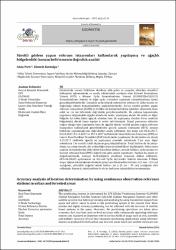Sürekli gözlem yapan referans istasyonları kullanılarak yapılaşmış ve ağaçlık bölgelerdeki konum belirlemenin doğruluk analizi
Citation
Pırtı, A. , Kurtulgu, Z. "Sürekli gözlem yapan referans istasyonları kullanılarak yapılaşmış ve ağaçlık bölgelerdeki konum belirlemenin doğruluk analizi". Geomatik 6 (2021 ): 1-14.Abstract
The positioning process is determined by GPS (Global Positioning System)+GLONASS (Global Navigation Satellite System)+GALILEO (Galileo Navigation System) and other satellite systems that help in processing and analysing by using transmitted signals from space and which comes to mind as the positioning system at the present time. More precise and highly accuracy positioning can be achieved with the increase of satellite based systems in the space. Moreover, the positioning operations are taken place economic, fast, real time and cm-level accuracy with continuously operating reference stations and is played an important role in various fields of usage such as civil, scientific and military. Accuracy of real time kinematic positioning applications using reference stations is analysed for both urban and forested areas which are satellite views are not or less, multipath effect is intense. Six points has assigned in the study area. These points have been determined two points in the built-up areas, other two points in the forestland and others two points are that little far in the built-up areas and forestland. These six points were measured on November 2th 2017, on November 3th 2017, on November 4th 2017 and on November 5th 2017 with VRS (Virtual Reference Station) and FKP (Flachen Korrektur Parameter) techniques. Static measurements were made 2 hours for points in the forestland and built-up area and 1 hour for other points. Horizontal, vertical angle, horizontal distance, tool height and mark height were measured with Total Station. Later, in these measurements coordinate differences, distance differences, satellite numbers and RMS (Root Mean Square) values have analysed and evaluated. It has been noted that the integer ambiguity has been resolved in this evaluation. The obtained horizontal differences between VRS and Static survey are +/- (1 mm-4.5 cm) and the height differences obtained +/- (5-30 cm). And this differences determined that an error can be made with effects of GPS+GLONASS satellites and GNSS receiver's Z-Blade signal processing technology. In addition, the significance of these differences was examined by statistical test.


















